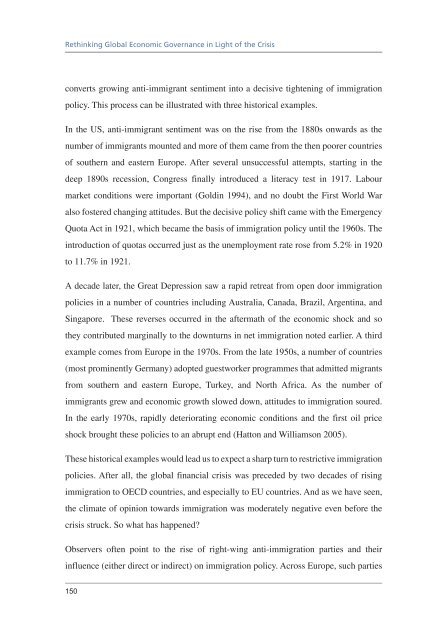Download PDF - Vox
Download PDF - Vox
Download PDF - Vox
- No tags were found...
You also want an ePaper? Increase the reach of your titles
YUMPU automatically turns print PDFs into web optimized ePapers that Google loves.
Rethinking Global Economic Governance in Light of the Crisisconverts growing anti-immigrant sentiment into a decisive tightening of immigrationpolicy. This process can be illustrated with three historical examples.In the US, anti-immigrant sentiment was on the rise from the 1880s onwards as thenumber of immigrants mounted and more of them came from the then poorer countriesof southern and eastern Europe. After several unsuccessful attempts, starting in thedeep 1890s recession, Congress finally introduced a literacy test in 1917. Labourmarket conditions were important (Goldin 1994), and no doubt the First World Waralso fostered changing attitudes. But the decisive policy shift came with the EmergencyQuota Act in 1921, which became the basis of immigration policy until the 1960s. Theintroduction of quotas occurred just as the unemployment rate rose from 5.2% in 1920to 11.7% in 1921.A decade later, the Great Depression saw a rapid retreat from open door immigrationpolicies in a number of countries including Australia, Canada, Brazil, Argentina, andSingapore. These reverses occurred in the aftermath of the economic shock and sothey contributed marginally to the downturns in net immigration noted earlier. A thirdexample comes from Europe in the 1970s. From the late 1950s, a number of countries(most prominently Germany) adopted guestworker programmes that admitted migrantsfrom southern and eastern Europe, Turkey, and North Africa. As the number ofimmigrants grew and economic growth slowed down, attitudes to immigration soured.In the early 1970s, rapidly deteriorating economic conditions and the first oil priceshock brought these policies to an abrupt end (Hatton and Williamson 2005).These historical examples would lead us to expect a sharp turn to restrictive immigrationpolicies. After all, the global financial crisis was preceded by two decades of risingimmigration to OECD countries, and especially to EU countries. And as we have seen,the climate of opinion towards immigration was moderately negative even before thecrisis struck. So what has happened?Observers often point to the rise of right-wing anti-immigration parties and theirinfluence (either direct or indirect) on immigration policy. Across Europe, such parties150














